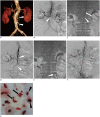Percutaneous Aspiration Embolectomy Using Guiding Catheter for the Superior Mesenteric Artery Embolism
- PMID: 26175572
- PMCID: PMC4499537
- DOI: 10.3348/kjr.2015.16.4.736
Percutaneous Aspiration Embolectomy Using Guiding Catheter for the Superior Mesenteric Artery Embolism
Abstract
Objective: To evaluate the technical feasibility and clinical outcome of percutaneous aspiration embolectomy for embolic occlusion of the superior mesenteric artery (SMA).
Materials and methods: Between January 2010 and December 2013, 9 patients with embolic occlusion of the SMA were treated by percutaneous aspiration embolectomy in 2 academic teaching hospitals. The aspiration embolectomy procedure was performed with the 6-Fr and 7-Fr guiding catheter. Thrombolysis was performed with urokinase using a multiple-sidehole infusion catheter. The clinical outcome was investigated retrospectively.
Results: Superior mesenteric artery occlusion was initially diagnosed by computed tomography (CT) in all patients, and all patients had no obvious evidence of bowel infarction on CT scan. Percutaneous aspiration embolectomy was primarily performed in 6 patients, and thrombolysis was initially performed in 3 patients. In 3 patients who received primary thrombolysis, percutaneous aspiration was undertaken because the emboli were resistant to urokinase. Complete angiographic success was achieved in 6 patients and partial angiographic success was accomplished in 3 patients. One patient underwent bowel resection. One patient died of whole bowel necrosis and sepsis, and 8 patients survived without complications.
Conclusion: Percutaneous aspiration embolectomy is a useful tool in recanalization of embolic occlusion of the SMA in select patients.
Keywords: Aspiration embolectomy; Embolism; Superior mesenteric artery.
Figures

Similar articles
-
Aspiration therapy for acute embolic occlusion of the superior mesenteric artery.World J Gastroenterol. 2019 Feb 21;25(7):848-858. doi: 10.3748/wjg.v25.i7.848. World J Gastroenterol. 2019. PMID: 30809084 Free PMC article.
-
Short-term experience with aspiration embolectomy using a ACE68 reperfusion catheter to treat embolic superior mesenteric artery occlusion.Emerg Radiol. 2021 Jun;28(3):675-678. doi: 10.1007/s10140-020-01896-w. Epub 2021 Jan 8. Emerg Radiol. 2021. PMID: 33417115
-
Percutaneous Mechanical Thrombectomy Using the AcoStream Thrombus Aspiration System for Acute Superior Mesenteric Artery Embolism.Ann Vasc Surg. 2024 Sep;106:264-272. doi: 10.1016/j.avsg.2024.03.010. Epub 2024 May 28. Ann Vasc Surg. 2024. PMID: 38815920
-
Modern treatment of acute mesenteric ischaemia.Br J Surg. 2014 Jan;101(1):e100-8. doi: 10.1002/bjs.9330. Epub 2013 Nov 20. Br J Surg. 2014. PMID: 24254428 Review.
-
Mesenteric ischemia.Curr Opin Crit Care. 2015 Apr;21(2):171-8. doi: 10.1097/MCC.0000000000000189. Curr Opin Crit Care. 2015. PMID: 25689121 Review.
Cited by
-
Aspiration therapy for acute embolic occlusion of the superior mesenteric artery.World J Gastroenterol. 2019 Feb 21;25(7):848-858. doi: 10.3748/wjg.v25.i7.848. World J Gastroenterol. 2019. PMID: 30809084 Free PMC article.
-
Acute mesenteric ischaemia in the elderly - results of combined endovascular and surgical treatment. Primary study.Sci Rep. 2025 Jan 2;15(1):74. doi: 10.1038/s41598-024-84026-7. Sci Rep. 2025. PMID: 39747507 Free PMC article.
-
Review: Acute superior mesenteric artery embolism: A vascular emergency cannot be ignored by physicians.Medicine (Baltimore). 2019 Feb;98(6):e14446. doi: 10.1097/MD.0000000000014446. Medicine (Baltimore). 2019. PMID: 30732209 Free PMC article. Review.
-
Percutaneous aspiration embolectomy of superior mesenteric artery using a 5MAX ACE reperfusion catheter.BJR Case Rep. 2016 Nov 2;2(4):20160039. doi: 10.1259/bjrcr.20160039. eCollection 2016. BJR Case Rep. 2016. PMID: 30460036 Free PMC article.
-
A case of endovascular treatment for intestinal ischemia due to acute superior mesenteric artery embolism after TEVAR.J Surg Case Rep. 2019 Jun 14;2019(6):rjz185. doi: 10.1093/jscr/rjz185. eCollection 2019 Jun. J Surg Case Rep. 2019. PMID: 31214322 Free PMC article.
References
-
- Björck M, Acosta S, Lindberg F, Troëng T, Bergqvist D. Revascularization of the superior mesenteric artery after acute thromboembolic occlusion. Br J Surg. 2002;89:923–927. - PubMed
-
- Gupta PK, Natarajan B, Gupta H, Fang X, Fitzgibbons RJ., Jr Morbidity and mortality after bowel resection for acute mesenteric ischemia. Surgery. 2011;150:779–787. - PubMed
-
- Park WM, Gloviczki P, Cherry KJ, Jr, Hallett JW, Jr, Bower TC, Panneton JM, et al. Contemporary management of acute mesenteric ischemia: factors associated with survival. J Vasc Surg. 2002;35:445–452. - PubMed
Publication types
MeSH terms
Substances
LinkOut - more resources
Full Text Sources
Other Literature Sources

